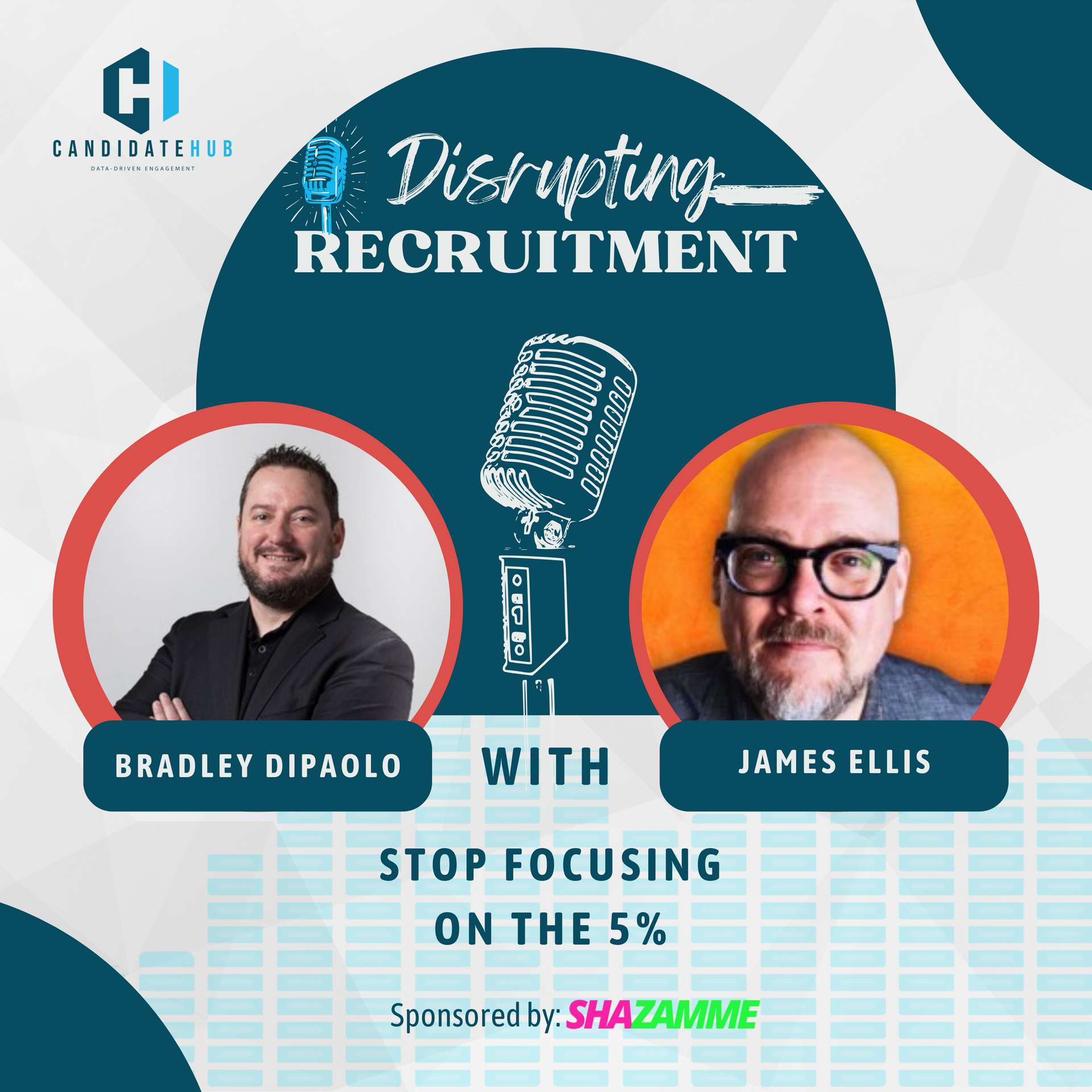Stop focusing on the 5%

Bradley: Okay. So we have James Ellis back on the show. I think you were in season one and now you're back for season three.
James: Yeah. My court order finally came through. I can finally come back.
Bradley: I think if we did the math on it, I think you own the record for most reappearances on a podcast.
James: I have that multiple places.
People who have me on. It's funny. They bring you back. Recruitment flex has had me on five or six times. Yeah. Yeah. It's like I'm waiting for the jacket. Give me the jacket
Bradley: I know. Serge told me in the last episode that I had him on here. Cause I've been on there once and I'm like, dude, you got to get me back on and he was like, we need to have you on five times. So you get the jacket, like James. But yeah a little behind the scenes for the listeners. Normally the way podcasts work is the host would send the speaker and agenda and focus on
James: them. Don't tell them the secrets that it's all planned,
Bradley: Yeah, don't pay attention to me. But so James posted something on linkedin the other day that I saw and I'm like, I need to riff with James about this on air. So you made a post about People targeting and spending a ton of money to target 5 percent of the market that everybody else's is targeting and I know we, we have we have all of these people talking about active and passive candidates for years, which I don't like.
James: Yeah, I feel like the terminology is really sloppy or we, yeah, it's such a strange model. I think, look, the bottom line of it is you're spending 95 percent of your budget on the 5 percent of the audience that one, they've already raised their hand and you're like because they've raised their hand, and by that, they're on your job boards, they're clicking on your ads, they're looking at your videos, they're on your career site, they're doing job seeking activities, right? They're in market for a job because nobody does those things if they're not looking for a job. I'm sorry. Someone's told you that, right?
No one's watching your stupid day in the life videos unless they're actively looking for a job. So there's only 5 percent of the audience. The problem is, if they're on job boards, everybody knows they're looking for a job, and thus everybody is targeting that exact same 5%. Now, there's value in that to some extent. Where, because you can target them. It's not like you're taking your marketing message and just throwing it out the window and hoping somebody gets to it. You're talking to people who are in market and there is a way of going about that. The problem is you're over investing in it. You're putting 95 percent of your budget instead of saying, I don't know, 50 or pick a number.
It doesn't really matter. There's no good number there. But 95 is way too high. The challenge is How do you talk to the rest of the audience? How do you talk to the 95 percent of people who are not looking for a job today but they will be tomorrow, so that you're not fighting the 5 percent fight at the job board because they know so much about you, they like you already that when they're ready to look, they don't go, show me project manager jobs on Indeed and there's 4 trillion choices and good luck there. It's a lottery, right?
Instead they go, Oh, I really like that company, I want to go see what they're up to. That's where the win is. So there's data around B2B to say the 5 percent and 95 percent model. And feel free to argue with it. Feel free to tell me it's 10/90. Feel free to tell me it's 20/80. I don't care.
The challenge is, you're focused on the small market that's over invested in. You can't win that fight unless you've got Google sized pockets. Instead, plant seeds to people who aren't ready to look for a job today, but they will be tomorrow. Cause those are the people you're going to want to talk to and you'll talk to them so much cheaper.
They'll come to you if you do it right.
Bradley: Yeah. It's one of the things that we talk about at CandidateHub is where opportunity meets readiness. And so you have this opportunity. And you're trying to buy the people that are ready now. And that is the most expensive way to do it. I talked, it's been a while since I've made this sort of analogy, but you're from Chicago, which is a hockey town.
There's three ways to build a championship team. One is by acquiring talent through free agency, which is the most expensive way to do it. Cause if Conor Berdard, Sidney Crosby those types of guys. Become available on the market. Everybody's going after them and you're going to have to pay top dollar to get them.
The second way is through trades, which in recruitment is the, the equivalent of basically hiring a headhunter to go steal somebody from your company. I can get a top talent through a trade, but it's going to cost me, it might cost me a first round draft pick or a prospect or somebody like that. It's the same thing in recruitment. If I want to go, pull talent from another team, it's going to cost me.
But the third and the really only way to truly build a championship team is through draft and that's the one that only the true sports fans pay attention to. Because it's a long term game.
James: Yeah. You can't draft your way to next year's victories. You draft your way into three years from now. But yeah, exactly. It takes time to get
Bradley: unless you're the Chicago Blackhawks and could draft Conor Berdard, but that's but they don't come in the draft every year. The draft is what you're talking about. That's the 95 percent that nobody is talking to that, yeah. As an organization, we need to be building that. That's our farm team. That's the company. That's the candidates that we need to be talking to and working through nurturing them and getting them interested in our company so that when they're ready, we're the ones they want to talk to.
James: Exactly.
And it's cheap and it's cheaper way cheaper. It's there's the there is a level of risk. There's a level of uncertainty about that. But at the same time, the balance of risk versus investment is so wildly skewed the other way, right? You can buy a great hockey player and game to they snap their ankle like a twig. Your investment is now worthless.
You can buy great talent and have them show up. But look, we all know hiring managers feel like they only have a 50/50 shot at getting the right person that they've picked the right person. So the math there just messes you up. It makes more sense to build a pipeline of people to say,
I'm going to talk about what makes my company interesting? Not good, not a wonderful place to work. And I won't use the word great in that sentence because I don't want to give those people any more press than they need. But just, nothing that says, Oh, we're the best place to work. We're a fantastic place to work. It's about how are you different?
Every company has good and bad. Every company and I'm gonna let me be crystal clear. Whoever's listening to this. I'm talking about your company. Your company has good and it has bad reasons. There are parts of it that are great and there are parts of it that absolutely suck. And to get away from it, to pretend, let's just put cheerleader pom poms on and say, we're a wonderful place to work and just shout that from the rooftops and videos that say, hey, look how great we are.
And social posts that say, look all these things we won. Look at these awards and look at all this money we gave charity. We're great. We're great. We're great. That's not how you win. The answer to winning the game of how do you get those 95 percent of people to become interested in you enough so that your top of mind in their minds when the time comes is to say something meaningful and valuable and to say it without an expectation of they're going to see it and go, Oh, I got to work there. Apply because that's not how that works.
It's not how that works. I think we've, as an industry, we've taken so many good and bad lessons from consumer marketing about how they think people buy things and make choices. And the truth is our lessons should come from the property industry. If you go looking for a home, think of the amount of information on a Zillow listing or a Redfin or wherever you are.
All the information on that particular property. It is specific information, not just numbers of bedrooms and bathrooms, not just year it was made, but I'm saying. Here's the past five years of taxation. That is a level of specificity and credibility that you're like, Okay, that's real data.
That's not in somebody's opinion. Is it a nice place to live? It is, in fact, this is how expensive it is to live here. This is what the HOAs are. This is where the school district is. This is whatever. All that data is there. And at the bottom of that, it doesn't say, Buy. It doesn't do that. It says, I'd like to learn more, I'd like to set up an appointment, I'd like to engage a realtor, whatever that is.
That's the call to action. That is the model we should be facing because there are plenty of people who shop for houses who have no money, who have no, who are not ready to buy. It'll be years, but they want to keep an eye on the market.
They want to see what the neighborhood's they just happen to live there. They want to see what's moving around. It's really interesting stuff. It's not, this is what the sales figure was. So we're learning some bad lessons about how do we get people to just hit the buy button, in our case, the apply button.
Because truly, and I'm going to say this and it's going to be uncomfortable, anybody who hits the apply button without watching three of your videos is probably not worth talking to anyway. They just hit every apply button they can find, sorry!
Bradley: Yep. It's too bad there wasn't a tool out there that would tell you if they've done that or not.
James: That would be handy.
Bradley: Um, And I've talked a lot about candidates. Our job shoppers and I reference e-commerce a lot, but my reference to e-commerce is I want to take that e-commerce personalization approach and apply it to recruitment at scale. But when people buy a job, they're buying a job, much like they buy a house or a car, right?
My brother and I joke that, we both have we both have RVs, right? And so we, buying a new RV, going from this model to the next one, we joke is like a three year process, but it really is, right? I had to look at all the different models. I got test it and see if it fits for my family and I might look at 50 different RVs before I finally buy one
James: because you're trying to make an informed choice and I swear to God, why don't we talk about the concept of informed choice when it comes to recruiting ever? That makes me crazy.
I don't want to cajole someone into applying. I don't want to browbeat someone into saying yes. What I want them to do is understand the pros and cons, understand the comparative value relative to other opportunities and say, hey, this is the place that works for me, because when they do that and with information and competitive information, they're much long, much more likely to stick around.
They're not going to see the first. If you just browbeat them and saying, we're great, the first time they see something at work that isn't great, they're going to say that I was lied to, because they were, and they'll walk away. Instead, if you give a more full picture of cause like, look, it's shopping for an RV and I'm not an RV guy, but I can make some guesses here.
There's no such thing as a perfect RV. Everything is a balancing act. If you get more horsepower and torque, you get less fuel efficiency. If you get more space, you get less fuel. Like everything's a transactional process. You have to choose what makes sense for you. And so going out there and saying we're the best place to work, it's the same thing as saying we're the best RV.
It doesn't make any sense. It's what fits your needs, what fits your situation, what fits what you're looking for, what you're driven by, not to use a pun there, but that's what it's about and it means taking time to get the information and that means getting information from other places to make a strong decision.
Bradley: So here's. My thought that I would like to see more companies. Do you want to talk about standing out from the crowd? Everybody right now is trying to shout how great we are.
James: Yeah. They're all, we've become cheerleaders, it's sad
Bradley: testimonials, and blah, blah, blah, fluff. , right? But when I'm hiring somebody, I am buying their talent, their skill to solve a challenge or solve a problem. I want them produce results. You, what nobody talks about is the challenges they're trying to solve. So we are looking for a data scientist because we have this particular problem that we want to fix. And because people love to think of that solution, right? Like I could fix that problem, Ooh, that would be a fun challenge, I would love to try that. So if we actually spent more time talking about what the hell was wrong with our company versus what. It's so blah, blah, blah about it. We would be having very different conversations.
James: 100 percent 100 percent and I think getting even farther this idea that let's not talk about job postings as you will have at 5, 000 years experience in this skill, you must be certified in these things, which always sounds like you're very yelling and shouty to me. You will have these things. You must have these things. These requirements, right? It's got that tone of voice to it. You're like, why are you shouting at me, dude? You're begging at me to work here. Instead, if we said, look, what we're trying to do is solve problem ABC. And we think that problem is solved via these tools or these skills. If I'm trying to hire a salesperson, if you ask a thousand people who hire salespeople, you might hear that their number one skill set is knowledge in Salesforce, the ability to manage the data, manage, relationships within Salesforce, for example.
But if you're hiring a salesperson, there are other ways to make sales. You could make content. You could be incredibly charming on the phone. You could be living next door to the CEO of Bear Stearns. Bear Stearns doesn't exist, so I guess that's a safe one, right? And say, look I'm friends with them, so I can bring them as a customer.
There's a lot of ways to make sales. So when you're hiring a salespeople, it's a salesperson. We're always so focused on you. We'll have these skill sets. You're like, no. That is a way of solving the problem, but it's not necessarily the only way of solving the problem. And if instead you said, we're trying to solve this problem, we'd love to hear your ideas on how to solve it because you, turns out, may know more than we do, spoiler, they do, about how to solve this problem. And suddenly you're becoming more flexible about what you're looking for. And suddenly you can hire more talent, but that means being more open about this is what the company is all about. This is what we're trying to achieve. This is what we're trying to build. And in this case, this is the immediate problem we'd like to solve.
Bradley: I just went through this exercise actually looking to hire a salesperson for CandidateHub. And the conversations I was having with potential talent is, look, this is our challenge. Like we need clients, we need to do this. We need to do that. this is what we're doing today. This is the issues we're running into. I, we're a small company, I'm doing it all, I need some help. We, and I don't mind air in our dirty laundry because this is exactly the,what I'm talking about. If you need to know, people need to know this. We are we're looking for somebody that can help us build the process and build our help us build our pipeline. And yeah, we have, the technology to do it, but we need boots on the ground. And so I didn't spend all of my time in the interviews going. Oh, we're this great company and oh, I just won a top 100 leader, blah, blah, blah, blah, just blah, blah, blah.
It's, this is what I'm facing today. This is what I need help with. This is what it could lead to. And I think based on your experience, you can help us solve that problem. Is it a challenge you're interested in?
James: And I think as we get, as we as cultures grow we're definitely getting to the point where, and the data backs it up that says twenty years ago, if you were hiring someone, chances are you knew more about what you were hiring for than the person you were hiring, right? They were a developer, you were a senior developer, you were hiring a junior developer, and they learned all their development skills at college. The same college you went to, by the way, and taking the exact same classes you did, you just have five more years of experience, so you know more than they do.
Now we're hiring ChatGPT prompt engineers, a technology that did not exist 12 months ago, who is making the choice? No one in the company knows more about ChatGPT than the person in front of them, the candidate in front of them. Every time I get hired as an employer brand, for an in house job, I know more about employer brand than anybody in that company.
That's why literally why they would hire me. That's why they hire strong recruiters because that recruiter knows more about that market and how to engage that audience than anybody else in the company. So if we start to embrace the idea that the candidate knows more than the company does, then suddenly the balance of power shifts.
So it's not about the company saying you will have these things. It's more about. Help us solve these problems. We'd love your ideas on how you would approach them. And that should be the interview process. Let's brainstorm, not get free work, but brainstorm about how, what's your approach to these problems?
Does that jive with what we're trying to do? Do we have the kind of same point of view on how we'd approach that? How what is like one of the great questions I like to bring in when I'm an employer brand in house candidate, I say, how do you measure that employer brand works? And honestly, most interview questions, that kind of stops there because they haven't gotten that far and they haven't thought about that and I have to step in and say here's three ways you could think about measuring employer brand. And it shifts the balance of power because it turns out the candidates have all the power. Everybody in your company is a fairly known entity. It is the spark from outside that is going to add real value.
But you're pretending like they're just a plugin. They're just a a bolt or a nut or a cog in the bigger machine. And the truth is they're bringing in a lot of value you don't have and you need that.
Bradley: Starting to sound like Darth Vader. I find your lack of faith in the force disturbing.
James: I find your lack of faith in this company disturbing.
I'm going to speak to HR.
Bradley: It's crazy. It's crazy. And like going back to this whole 95 percent thing and what drives me crazy is, the companies that are spending 50, 60, a hundred thousand dollars on job boards a month, and we won't mention the specific job board that they waste their money, spend their money on,
James: We already have
Bradley: but indeed it is a problem.
James: Indeed. It is indeed it is.
Bradley: But it's crazy how they're spending that much money trying to buy the data that everyone else is buying, that they probably already own anyway.
James: Oh, I'll take that a step further. It's crazy how much money they're spending to buy that data using job posting that sound like every other company anyway, I'm not sure what it is, I'm not exactly sure what they're buying or what they're doing is saying Me Too. It's the equivalent of just job me Tooing and it's no, if you can't show how you're different in some way, shut the hell up. You don't have anything to say. You're just, I need more developers. Guess what? If that's how you hire commoditized talent by being a commoditized company, I'm sorry, that's just how it is.
And so if you can't figure out how to say something, that investment of 20, 50, and 100, 000 every month. Is effectively thrown out the window because you are getting talent that isn't elevating you because you're not respecting the platform, the process, and most importantly, the candidate.
Bradley: so when it comes to nurturing that talent.What if you were sitting down and because I know you have a training program where you train people how to do this. So let's go in that direction for a minute, because one, if you're in new to employer branding or even if you've been in employer branding and you haven't taken James' course you really need to do that.
So what kind of what do you guys talk about in that course? What are some of the things that you would say to somebody that's trying to learn more about employer branding and how to nurture this 95%.
James: Yeah. I feel like the people who come to my class and people who start to get serious about employer branding are the ones who have squeezed the lemon so hard that there's nothing left and there's no juice left in that lemon. They've squeezed it to death is gone and leveraging job boards and leveraging outreach and spamming tools and all this other stuff they've maxed out. They've done everything they can. And so what they realize is that by learning what is unique and specific about their company by telling a story about that level of specificity that about that unique idea makes all their other stuff.
It's like putting juice back in the lemon. Suddenly they're recruiting tools work better. Suddenly their job postings work better. Suddenly they're recruiting outreach works better because they're not sounding like everybody else. They're sounding like them.
So the class is about how do we get In your company, your HRBPs, your senior recruiters, your marketer, a comms person maybe even, I don't know, if you've got an employer brand already, let's bring them into the room and let's talk about, one, what is your competition saying? Where are the opportunities? Two, what are you already saying? Three, what are the things that you reward because if you understand what you reward, you have a far more credible and concrete story you can tell. Once you collect all that information, we go through a process where we identify the one, two, or three things that are unique to you, what are interesting about you, and then we blow it out and say, how do we tell stories about that?
How do we activate that idea? It's not rocket science, though certainly some people pay rocket science money for that sort of thing, and I don't understand why. But I honestly, I think if you do it as a company together, you get such better responses, such so many different perspectives on the company.
You can, you know how HR sees the company, how marketing sees the company. You might as well be talking about different companies for the most part. But if you bring them into the room and using model that says, what are people motivated by here? What are they being rewarded by? How do we connect those dots? Suddenly you're saying something that is true for the entire Company.
Now, when you identify what's interesting about the entire company, it turns out you're already doing good work to tell that story. You're just putting a blanket of polish on it. You shouldn't pull it back. Let's talk about what makes your company great and let's leverage the other side of that.
We're talking about the kind of balances the, not the transaction with the Tradeoffs. That's the word I'm looking for. The tradeoffs of an RV, right? If you want the high power, you're gonna have to trade off with low fuel efficiency. Okay, the same is true for your company. Do you want a run and gun, super autonomous organization?
Great! Is that what makes you unique? Fantastic! You should also talk about... The level of chaos, the level of uncertainty, the lack of structure and documentation, because you can't have one without the other. You can't have a a run and gun move fast and break things company where no one's breaking things, where everything's documented, where there are rules for everything that doesn't, it doesn't happen.
Flip it the other way. You can't have a company that supports everybody over the top. There's a lot of programs. The culture is all about making sure people feel good about themselves and feel good about the direction everything's going and still have a fast company. You actually give up a level of speed to reach that level of collective support.
So when you talk about what is interesting about your company, you should talk about what is really interesting about you, but also embrace the other side of it, the shadow of whatever that positive thing is. You've all seen the yin and yang symbol. Not everybody realizes that it's actually an embodiment of light shining on a mountain and the shadow casting on the valley next to it.
So there is a light side and a dark side because every light, which is great, cast a shadow, which isn't so great. So the stronger the light, the stronger the shadow. So let's embrace both of it. So that means telling stories, not just about how you're great, but the kind of people who find that really attractive.
The people who are willing to take the trade off and say, yep, I want more run and gun and less, because I'm willing to accept the chaos that goes with it. That is an infinitely more compelling story than anything you're seeing on award shows or Glassdoor. That's really where the story is. And then once you understand that story, There's a bajillion ways to tell that story.
It's videos, it's social, it's, tech talks. If you want, you can do Instagram. It doesn't matter. There's a million ways, job postings and career sites and events and all that other stuff. There's a million ways, but until you understand what you're talking about, you're just doing more, we're a wonderful place to work and you sound like everybody else.
Bradley: Yeah, it's yeah, more people need to talk about not only what they are, but what they're not
James: 100%
Bradley: And like you said, there's a million ways to tell it. And I remember you telling stories of, going to a conference with a piece of chalk and writing on the sidewalk, like looking for developers.
James: Yeah. If you know your audience and you know where they are and you know what they care about, the means by which you connect to them isn't function of. Budget, it's a function of willingness to try something unusual.
Bradley: Yep. And this is where that e-commerce personalized journey at scale is important because once you're starting to put out all of this content then you really do want to be tracking who's engaging with that content.
And, If they do engage with that content, then I want to engage them with this content. And if they engage with this content, then I want them to see this. And if they do this, then I want a recruiter to know about it. And that's where marketing automation and tools like that comes into play to be able to take that content and those approaches and bring them up to the next level.
James: Yeah. So getting back to that 95 5 percent rule, let's take the metaphor in a different direction. We're talking about Lake Michigan, which is right outside my door. Apparently it's a big lake. And to say that you only can talk to the 5 percent means there's one pier that every recruiter is fishing off of.
Now, the value that is any fish coming by. wants a new job. The question is, how do you muscle out other recruiters? And the fight is very different. Now, if you go out in the middle of Lake Michigan and cast your line, it's unlikely you're going to get a nibble. It's not as likely. So you have to take a different approach.
You have to let bait out. You have to chum the waters. You have to draw them into you so that there's something interesting. And then the bait isn't about how do I grab them? It's about how do I open the door so that when they're ready, they know to come to me first. How do I Listen for signals that every other recruiter doesn't hear signals like, Oh, they watched that video when they didn't really have to. Oh, they're looking at my career site. Why would they do that? Oh, they're starting to get ready for that journey. They're starting to think about it. And then you have this amazing power, and this is where I want recruiters to live. Not in the how do I churn and burn candidates? But how do I have better relationships with people?
That is where recruiters get to live and say, Look, I'm not here to sell you on this job. I'm here to provide a point of view on why this job is different from others and that so powerful. I want a recruiter to tell me, look, this is what we're about. But I guess if you're talking to us, you're probably talking to a and B and C and let me tell you about them. They focus on these things, which is great. It's not who we are, so this is how you're making a choice. And honestly, there's two, two values to that. First off, one, I feel really good about the choice I'm making, and if I'm choosing you, I am all in, baby. Two, if I feel like you're giving me this information, I'm a fan of you as a recruiter for life.
I will talk to you in five years. When and not just to get a job, but I may know someone you want to talk to, and I would love to give you that recommendation suddenly. It is about creating systems in which the recruiter is not just casting lines and pulling them out as fast as they possibly can, and by the way, those fish get smaller and smaller every single day when you do it that way, Instead, it's about building networks and building reputation and building that kind of connection with talent about your company and whatever future company you work for that engages in a way that is going to pay off forever. That is where I want recruiters to live because that's, as a candidate, that is where I want my recruiters to be thinking.
Bradley: I can honestly say I've never had a recruiter talk like that in an interview, but if they did, they would stand out.
James: I've had that once. I've had that once. It was really eye opening.
Bradley: That's interesting. Yeah. Because you're right that that would stand out to me as this person gets it. They're not just trying to sell me they're they're trying to and in sales, we talk about relationship sales versus transactional sales, right? And the recruiters are living in that transactional sales world. And it's not necessarily their fault because they've been taught to go to what's closest to the money. Yep. They've been taught that for years. They have 50 recs, 100 applicants on each one of them. Yeah. And they just are putting out fires every day.
James: Hold on. I'm going to put it, I'm going to, I'm going to really piss some people off with this one. The reason recruiters are put in that position is because companies don't trust recruiters.
They say, here's a bag of candidates. Get one. Not, hey, what's a really interesting story you could tell about us? They don't trust that. They don't believe that. They don't think, the recruiters are just cogs in a machine. Recruiters just cost centers right for every recruiter, and by the way, what's the number one complaint of every recruiter in every company in America and North America and beyond?
I'm treated like an order taker. Yes, you are because you're not bringing relationships and information to the table. You're just taking what the hiring manager says, copies it, maybe runs it through chat GPT to make it sound like somebody else and pushes it out in the world. You're a conduit at best, but that's not what recruiters, what great recruiters are.
And I can prove that, and I say, if you look at every good executive recruiter, that is how they live. They build relationships. They're there to say, this is an opportunity that's in front of me, but let me tell you what's good and bad about it. Let me tell you about other companies and how they differ.
That is how headhunting, if that's still a word, if anybody still uses it, that is how still executive recruiting works because they respect that quality of talent. Now, the truth is that level of respect is starting to trickle down. If you know how to use GPT, you're as valuable as your next CMO. So they're starting to treat you as that value.
If you're just a commoditized talent, that's all they're going to ever treat you as. So how do you as a company start to say we trust our recruiters to tell a better story and not just go off in the wilderness and do say what they want? Here's a side note. I love being in talking about employer branding and somebody in legal says "I don't know, how can we be sure that every recruiter is going to say that?" And I give him a pause and I say, hey, what do you think recruiters are saying right now? When's the last time you saw a recruiter outreach message? What, how many recruiters do you have? How many people do you think they speak to? And let me tell you, not a single one of them has ever checked with legal, or comms, or HR if that was a thing that was okay to say.
And that, and the blood rushes out of their face. Oh God, we have a hundred people working here and they're saying all sorts of crap and no one can control it. Yeah, that's right. So here
Bradley: no one should
James: and that they shouldn't but at the same time what they should be doing is feeding recruiters good stories, good ideas, so that when recruiter A says this is a wonderful place to work because we provide support recruiter B isn't saying no this is a wonderful place to work because we're incredibly innovative because those two things don't line up very well having a consistent idea a north star not in a parroted set of Bullet points, you have to say these seven things, but more about look, the reason why Facebook is Facebook and Pinterest Etsy is not because they sell different things, but culturally, they're radically different companies. And I know that because every time I talk to Facebook, I hear the same ideas, not the same words, but the same ideas move fast and break thing is just the cherry on the top.
They always talk about fast and innovation and changing and pivoting, and they have 100 different words for saying the same thing. But they are, in fact, all saying the same thing. Pinterest talks about empowerment, they're empowering their people. They say it a thousand different ways. Every recruiter, every marketer, every social media person. Empowerment empowerment. Do they all say it differently? Absolutely, but because they're all singing from the same, hymn sheet, so to speak, I believe what they're saying far more than the recruiter says, you should work here., join me, we're hiring, we're a great place to work. That doesn't mean anything.
So what I want to do, and when I think about employer brand, I think about it as a means of empowering and adding, building respect for recruiters. To get out of that order taker model to say, look, you are a consultant of talent of the talent market. Here is how you present this company. Here is how you extract information from your hiring manager.
So you can present that information and have and build better relationships over the long-term for yourself and for your company
Bradley: that reminded me of a video that Adam Gordon did.
James: Adam Gordon is the best, by the way. I adore Adam, and I'm so thrilled he's picking up this banner of recruiting enablement, I love it.
Bradley: I'm going to go there in a second, but and I love Adam too, because I've told this story a million times, but when I started building Candidate Hub, I modeled it after Candidate.ID, much like WestJet here in Canada modeled their business after Southwest Airlines in the U. S. That, that was my goal, that was my vision. And the first person I talked to about that was Adam Gordon. And he was like, yes, let's do it. Cause that's just the type of person he is.
But he came out with his video years ago or a couple of years ago. And I was like, damn it. I don't know how you beat me to that. It was like people fishing on a pier and all of these, guy walks up with his fishing rod there's all these people fishing already.
What you're just talking about right there feeds 100 percent into Adam's new business Poetry, which is all about recruiter enablement. Because if you and I are recruiting, in the same company, you might have these great stories that I don't know about, and I can't tell them, and I can never tell your stories as well as you can, but I can still share them, right?
And so if we had a spot for, all of this content to go so that recruiters could pull from it and all be talking the same stories that would be extremely powerful. And that's what Adam is trying to accomplish with recruiter enablement and I love it.
James: Yep. I'm 100 percent on board. I love it because the truth is when you treat recruiters as cowboys and cowgirls who just go out in the lonesome prairie doing whatever they do to whatever candidates and say whatever they want, you're asking them to bear the burden of all of it. And the truth is not every first off, no recruiters ever been trained. I'm sorry. I'm just, let's just go ahead and put it out there.
Recruiters learn their skills, the hard way, school hard knocks left, right and center. The problem is, recruiting gets better when it gets done together as a system, as a process. And it doesn't, when I say that recruiters get all, I don't know, because it makes the, makes them think that I'm trying to tell them not to be individuals and they can't do it their way.
The truth is when you work together, you work better and doing it in such a way that still allows for unique personalities and individual points of view to still shine through. And that is where recruiting is heading to say, how do we work better together? Because individually. We've maxed out, we've done everything we can.
The real next level of recruiting skill sets are about how do we work together to achieve more in a two plus two equals 47 kind of model.
Bradley: And everybody in our generation who are now in the TA leader roles. Got into recruitment as a stepping stone into HR. That was why you did recruitment. You're new in HR? Here let's put you in recruitment and we'll, work you in an HR generalist role and blah, blah, blah. And so there's still that mentality of recruitment is just a cog in the wheel. It's a step in the direction that you want to go.
James: And it kills me. It kills me because that's where you're growing the entire company.
Talent acquisition grows businesses. I'm going to say that one more time, because I think somebody, I think people just pass right past that one talent acquisition grows businesses without people that talent acquisition brings in there is no company. There's no innovation, there's no sales, there's no development, there's no growth, there is no company. Now, if that's true, why the heck don't we treat talent acquisition with the same respect that we treat sales, that we treat R and D, that we treat development and we don't, and we need to.
And the problem is because recruiters do not have a process. They don't, they can't work in systems. Individual headcount is an individual unit add on instead of a systemic add on where two plus two does equal five instead of two plus two equals four. And that is where recruitment gets in trouble is because it's just they're individuals. And when they have these team meetings, it's complaints. It's okay. Who's what's on fire? How can we help each other a little bit just to keep people from jumping off bridges?
But ultimately, It's about how do we vent? How do we complain? But at the end of that meeting, everybody scatters to the where they ever, they want to go. A model that's enablement driven that's employer brand driven is more strategic. It allows each recruiter to achieve more and very often to achieve more by doing less. And that is where recruiting does its best work. And I don't know why we're having such a hard time moving from this transactional model of recruiting to something more relationship or systemically driven.
Bradley: I think it's because. We're stuck in the middle of a forest fire
James: there's that,
Bradley: and we're trying to put it out.
James: And so one teacup at a time.
Bradley: One teacup at a time yep.And I, I think I think we just need to let the fucker burn and plan a new forest. I have no problems that. We we've it's gone too far. It's unsalvageable. Let the house burn down and we'll build
James: a new one. It will. And it will be better because we've learned some lessons.
Bradley: There you go. So listen I, I just love talking to you. Like you're so energetic and you have so many great ideas. We'll see if we can't beat the recruitment flex and have have you on here five times.
We're at two now, so here we go. We're on our way. Okay. There we go. We're counting them up. We're good to go. Thanks,
James. Great having you. And we'll put a link to your bio and all that stuff in the post so people can track you down. Most people I'm sure know how to find you anyway.
You're not you're not, I'm not
James: shy. Yeah. I'm not putting my light under a bushel as my mother might say.
Bradley: All right, thanks a lot.
James:All right, thanks Brad.










